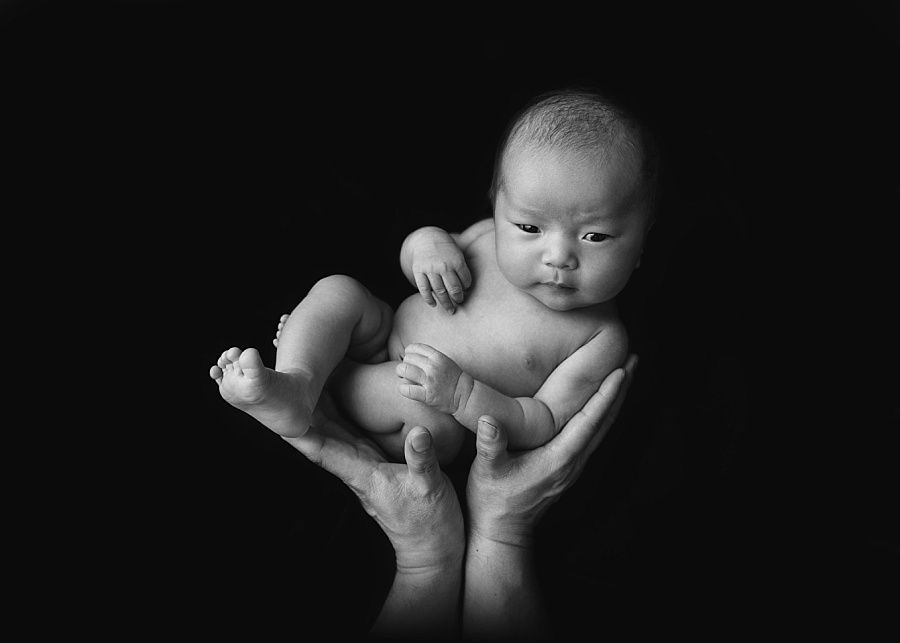How to tell when your newborn baby is tired
- Rachel Burnside

- Apr 1, 2022
- 4 min read
Updated: Apr 28, 2022
Learning to recognise your when your newborn baby is getting tired and ready for a sleep can be so useful in helping to avoid your little one becoming over tired, upset and difficult to settle. With newborns there is a very short time between the 'I'm feeling sleepy' stage to the 'I'm overtired' stage, so it's important to recognise and act on your newborn's sleepy cues as soon as you notice them.

Why noticing your baby's sleep cues is important (and helpful)
As a professional newborn photographer, I use these cues to ensure that newborn babies are happy and settled during their baby photo shoots. Most babies wake up at some point during the session, when they'll usually have a feed and settle back to sleep. Some however like to be awake for longer, so I will capture some beautiful wide-eyed awake images (which parents always love!) while baby has a good kick and some time to interact with me. At this point in the session I am watching carefully for the first signs that baby is getting tired and is ready to go to sleep again. At this point I will swaddle them while they are still calm and happy so that they drift back of to sleep and we can carry on with some beautiful sleepy posing. Having a good knowledge of newborn babies and their physiology is essential as a newborn photographer. It allows me to keep your baby happy and calm throughout the session and ensures that your newborn photo shoot is a relaxed experience.

How long can newborns stay awake for?
Newborn babies can cope with surprisingly short awake periods between naps in their first few weeks. Typically, your newborn will only be able to stay awake for between 45 minutes to an hour between sleeps, and this will include time spent feeding, so your baby's active, awake time at this stage will be quite short. When your baby is coming towards the end of this window and beginning to feel sleepy it is the perfect time to start settling them calmly ready for a nap.
So how do I know when my newborn is getting tired?
It's a tricky one! Newborns tend to exhibit very similar behaviours to communicate their needs because their control over their bodies is limited at this age. Crying, fussing, pulling their legs up to their tummies and rubbing their faces are common ways for your baby to show that they are unhappy, uncomfortable, hungry or tired which makes figuring out which one it is a challenge. However, a good starting point is to think about how long your baby has been awake and whether they are coming towards the end of their awake window. If they are and they have also been fed and changed recently, there is a good chance that the behaviours are telling you that your baby is getting tired.
Common baby sleep cues which can tell you that your newborn is ready for a nap include:
Avoiding eye contact and turning away from interaction. You might notice that your baby stops interreacting with you and turns their head away when you try to catch their attention.
Redness around your baby's eyes and eyebrows can be a sigh that they are beginning to feel sleepy.
Calmness and decreased activity. After a busy playtime kicking on their play mat you may find that your newborn lies quietly for a moment, and almost seems to 'zone out' and stare into space. This is the perfect time to get them ready to calmly drift off to sleep.

What happens when my baby is beginning to become 'overtired?'
If you miss the initial cues above, your baby can move to the next stage where they are close to becoming overtired. The time between the initial sleep cues and becoming over tired varies from baby to baby and can depend a lot on your newborn's temperament. When your baby shows the following behaviours it's likely to be time for a nap right away, before they become more unsettled and agitated.
Yawning. This is an interesting one, as we often consider yawning to be the first sign of tiredness, however once your baby starts yawning they are almost beyond the calm, ready to nap stage and beginning to become overtired. Ideally your little one should already be settled for a sleep by the time you see those sweet yawns.
Jerky leg and arm movements are another common sign that your baby is becoming more tired. They have less control over their movements and they need to rest.
Rubbing their eyes or ears, much like we do as adults is a sure sign of tiredness.
If your baby shows these advanced sleepy cues it's time to settle them for a nap right away or they will likely become over tired, upset and find it more difficult to fall asleep.

I hope you have found this article helpful is noticing your baby's sleep cues and helping to avoid them getting overtired and fighting sleep. If you have any comments or questions please leave them below. If you are looking for a Salisbury newborn photographer please visit the newborn section of my website so see more of my work.




Comments